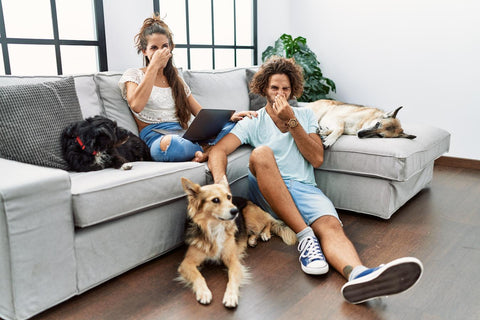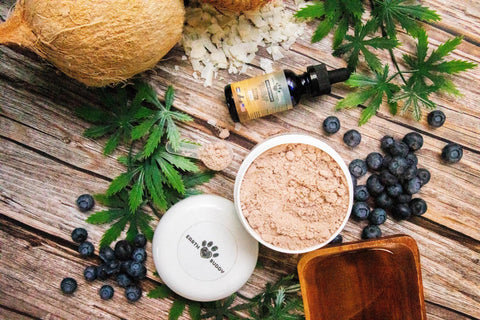You've likely heard the old phrase "let sleeping dogs lie." But what if your dog isn't lying so still? We explain the science behind doggy dreaming and what you can do about your dog's twitches.
Key Takeaways
- Your dog's sleep patterns are very similar to your own, which means they experience a REM sleep phase and non-REM sleep.
- Dogs may twitch while asleep, usually when dreaming, and this is completely normal.
- Various factors can make twitches more likely, including age, loud noises, and the type or intensity of dreams your dog is experiencing.
- If you think your dog needs help relaxing, consider giving them a supplement to help them out, like our Sleep Support Hemp Extract.
See Related: How to Calm a Panting Dog: 3 Tips & Tricks
Understanding How Dogs Sleep
You likely know how important sleep is in humans. But did you know that it's just as important in dogs?
That's right. Dogs need their beauty sleep, just like us. And they sleep in a remarkably similar way to us, too.
That doesn't mean they tuck themselves into bed (though when they do, it's absolutely adorable). It means dogs rely on sleep for the same reasons as us humans. Sleep is crucial for memory formation, muscle recovery, and much more.
And it also means dogs go through the same stages of sleep as us humans.
Sleep Cycles in Dogs
Those sleep stages include non-rapid eye movement and rapid eye movement sleep. The latter, known as REM sleep, is when we humans experience the most dreams.¹
So, if dogs also experience REM sleep, do they also dream?

Do Dogs Dream?
Yes - dogs do dream!²
Like humans, dogs tend to dream in different ways depending on a lot of factors. For example, research suggests that larger breeds of dogs have fewer, longer-lasting dreams than smaller dogs.³
Many of us pet parents have watched our dogs sleep, wondering what is going through their heads. Well, according to Harvard psychologists, your furry friend could be dreaming about their favorite person.⁴ And that's you!
It seems dreaming dogs are often thinking about their owners.
Now, that's not always true. After all, you might be the most important person in your dog's life, but their dreams would get a little boring if they only included the same person every single time.
Research also suggests that dogs learn while they sleep.⁵ Quality sleep may also be crucial for memory formation in dogs, as it is for humans.⁶
So, dogs experience all kinds of things when they sleep, particularly in the REM stage. But does that explain why twitching occurs?
Why Dogs Twitch In Their Sleep
When we fall asleep, our brain stem effectively turns our muscles off. If this didn't happen, our body might act out the things we do in our dreams.
Of course, some people do exactly that. It's called sleepwalking.
The specific part of the brain stem responsible for keeping us still in our sleep is called the pons. It does the exact same function in dogs.
The Brain-Body Connection
Just as humans sometimes aren't kept totally still by their brain stems, dogs sometimes move in their sleep. That's completely normal.
However, various factors can make these movements more likely.
Bonus: Can CBD Help Dogs Stop Scratching?

What Makes Twitching More Likely
Age
Remember, the pons is responsible for keeping sleeping dogs still. In younger dogs, the pons is still developing, which can lead to them twitching in their sleep.
The same is true in reverse for older dogs. As dogs age, their pons can become a little weaker than they used to be. As such, senior dogs might twitch in their sleep more than they did when younger.
Sleep Position
Interestingly, the way your furry friend chooses to hit the hay can impact the likelihood of twitching.
Generally, a sleeping position that leaves your dog more tense will mean less twitching. If your dog is curled up, for example, their muscles are less relaxed than when they sprawl out on their back.
And if their muscles are less relaxed, they are less likely to twitch.
Outside Stimulation
Our four-legged friends might seem to sleep soundly, but they can be affected by all kinds of outside stimulation.
Noise in particular can impact your dog's sleep. Loud sounds, like fireworks, thunder, or even voices, can all interrupt your dog's sleep, potentially causing them to twitch.
Dreams
Sometimes, we pet parents watch our dog twitch and just know they're dreaming. They can make the cutest little noises, like a quiet bark or growl.
In fact, "twitching" sometimes doesn't even seem like the right word. In the most extreme (yet funny) cases, dogs can act out entire chase scenes, all while lying on the floor fast asleep.
It's impossible not to notice this and wonder what, exactly, your pup is dreaming of. We already discussed their fondness for dreaming about you, but they could be imagining all kinds of scenarios.
You likely know all too well that these scenarios might not be good. We love our furry friends, so it's totally normal to be concerned or worried about them having a nightmare.

What to Do About Sleep Twitching
If you think your pup is stuck in a bad dream, don't worry. Remember, it's just a dream!
Try calling their name in a calm, gentle manner. That should wake them up. They might be a little groggy, so give them space and try not to startle them.
Generally, though, you should let sleeping dogs lie. Your dog's twitches are usually nothing to worry about, and twitching during normal sleep is totally normal.
Preventing Sleep Twitching
Still, your dog's twitches can be a nuisance. That's especially true if you let them sleep in the same bed as you.
After all, no one wants to be woken up in the middle of the night by a stray paw hitting them!
Our Pet Sleep Support Hemp Extract is one way to keep your pooch calm and relaxed. It can also help reduce the effects of normal environmental stress, as well as stress from traveling, hospitalization, moving, or other situations that may cause inner turmoil.
Of course, another technique is to make your pup sleep in their own bed.
Distinguishing Twitching From Something Else
Occasional twitching might be normal, but don't dismiss it too quickly. If your dog's twitches are particularly intense or occur more often than you'd expect, they might be a sign of something else going on.⁷
If that's the case, consult your vet. They'll be able to help you figure out the cause of your dog's twitches and work with you to get your dog back to an ideal doggy dreamland.

Conclusion
Dogs sleep in a similar way to us humans, and that extends to their tendency to twitch when the lights are out. Some twitching is totally normal, and can be impacted by age, noises, and dreams. You can try giving your dog a supplement with natural ingredients like CBD or CBDa to help maintain calmness if needed - you can start with our specially crafted Sleep Support Hemp Extract!
Keep Reading: What to Do When Your Dog Has Gas
Sources
- The Possible Functions of REM Sleep and Dreaming - Neuroscience - NCBI Bookshelf
- Do Animals Dream? with David M. Peña-Guzmán: Big Brains podcast | University of Chicago News
- Why Do Dogs Twitch in Their Sleep? | PetMD
- Harvard scientists discover that dogs dream of their human owners
- Brain scans show dogs learn when sleeping—just like people | Science | AAAS
- Sleep in the dog: comparative, behavioral and translational relevance - ScienceDirect
- Association between clinically probable REM sleep behavior disorder and tetanus in dogs - PMC, Sleep and cognition in aging dogs. A polysomnographic study
–
Earth Buddy is an environmentally conscious and family-owned company dedicated to providing natural solutions for pets. From our full-spectrum hemp extract oils to our colostrum supplements, our products are designed to promote calmness and encourage relaxation for our furry friends. To learn more and stay connected, follow us on Facebook, Instagram, LinkedIn, YouTube, and Pinterest.






Comments (0)
There are no comments for this article. Be the first one to leave a message!